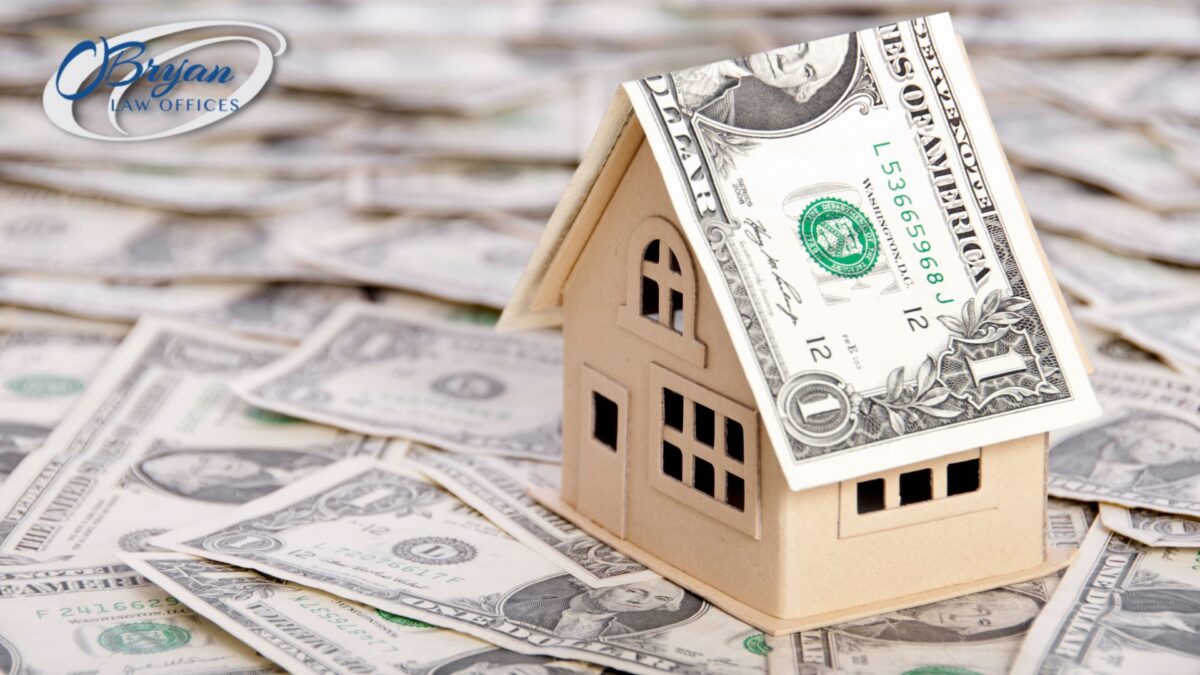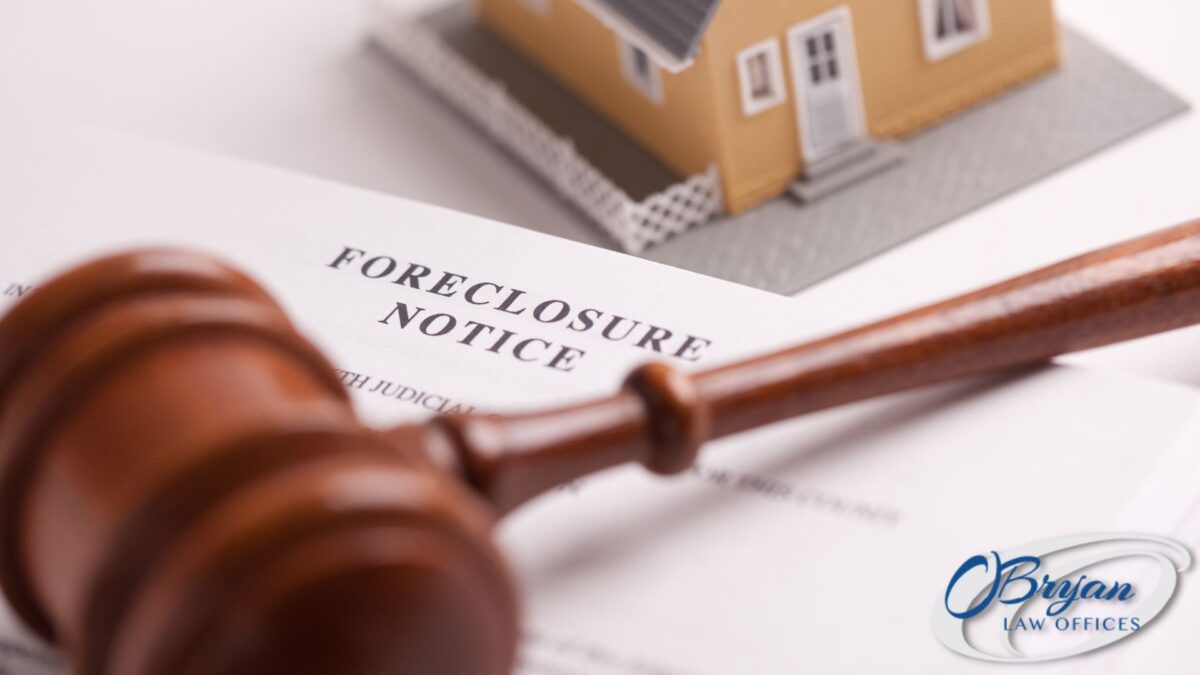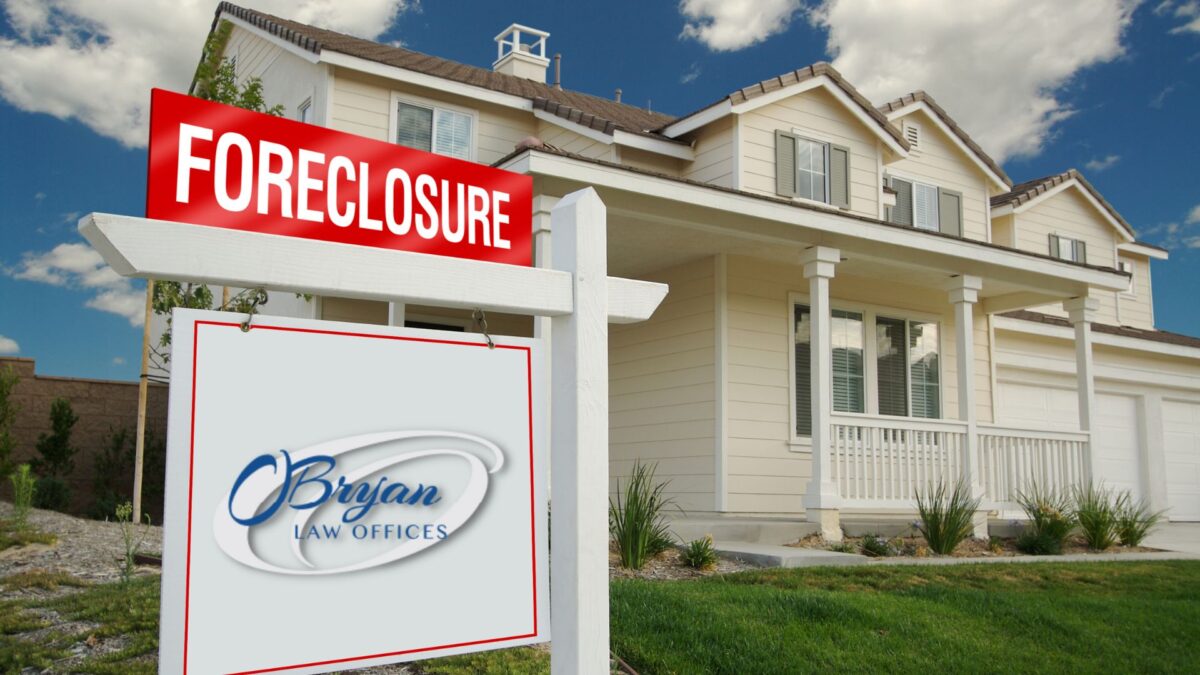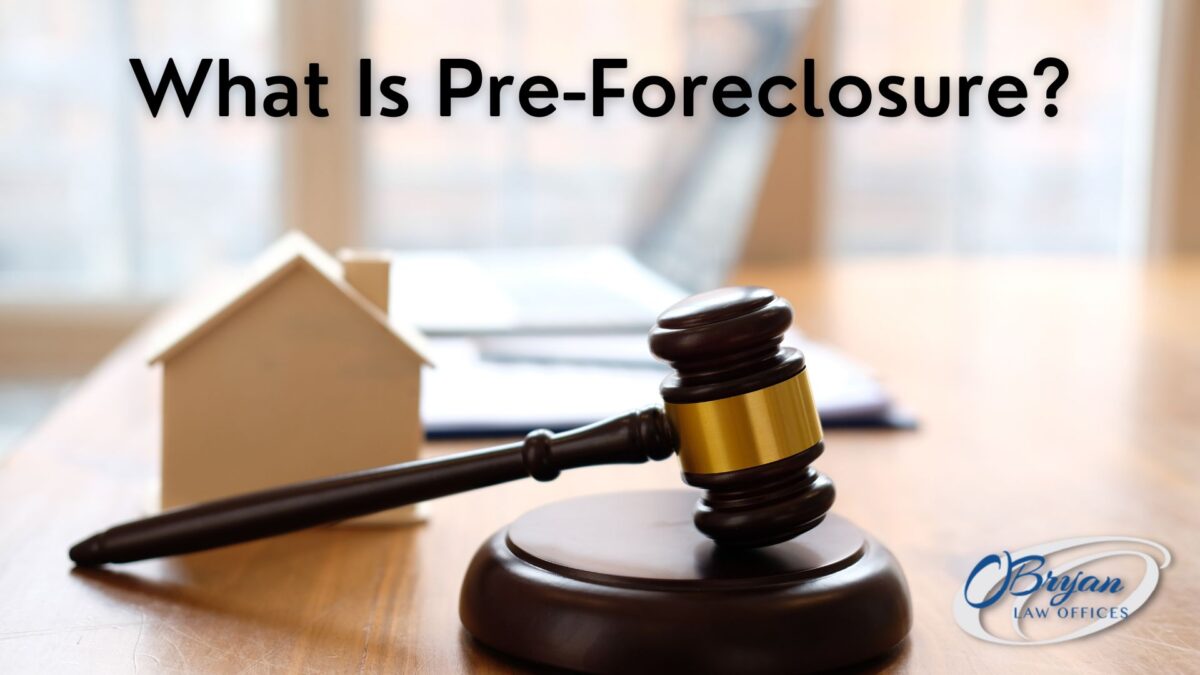Owning a home is a big responsibility and can come with many headaches, especially when you get behind on payments. Suppose you’re facing an unexpected financial situation like a sudden death or medical emergency. Your finances could take a huge hit. Unplanned expenses can keep you from making regular payments on your mortgage and other bills. This can then lead to debt and, eventually, foreclosure.
The first step of the foreclosure process is the pre-foreclosure. While it sounds as scary as foreclosure, you can still make up your missed payments and get back on track.
A Kentucky foreclosure attorney can help you stop an impending foreclosure and salvage your finances and credit history. At O’Bryan Law Offices, we’ve helped Kentucky and Indiana residents through this difficult time and are ready to help you. To meet with one of our experienced bankruptcy attorneys, call 502-400-4020 today.
Foreclosure vs Pre-Foreclosure
The pre-foreclosure on a home occurs before the official foreclosure proceedings. The mortgage lender will file for court approval to notify the homeowners of default. The pre-foreclosure warns homeowners that there is little time left to settle their debts before they put the home on the market. However, there is still a chance that homeowners can avoid foreclosure and negotiate with their lenders. To stop the foreclosure, the homeowners must pay off their debts to the lender.
The foreclosure process begins once the homeowner cannot pay the debts and stops the pre-foreclosure process. At this point, the lender will have received legal permission to evict the residents and put the home up for a foreclosure auction.
Additional reading: when is it too late to stop foreclosure
What Is Preforeclosure and How Does It Work?

Preforeclosure is the beginning of the foreclosure process. When homeowners take out a mortgage on their home, it’s an agreement that they will pay according to this contract. The monthly payment includes part of the principal and mortgage interest. Every contract is different, but they often have a small grace period before the payment is considered late. Once the payment is late, your lender will contact you regarding the late payment. If you think you’ll pay late or are already late, it’s important to keep an open line of communication with your lender so they know what’s going on.
The pre-foreclosure typically occurs when the homeowner is behind three to six months on their mortgage payments. The mortgage lender will notify the homeowners that they have started the preforeclosure process. They do this by filing a notice of default with the court system. The notice will be approved by a judge for a lien to be placed on the property. At this time, homeowners have several options to stop foreclosure. They can negotiate with their lender on their monthly payments or settle the debt by a deed-in-lieu-of-foreclosure or a short sale.
The notice of default is about a one to three-month-long process. This legal notice is a public record and states that you’re behind on your loan. Once the mortgage lender has filed the notice, it’s basically the last call to action that they give homeowners. If they don’t come up with a solution to pay off the debt, they will foreclose on the home.
Pre-Foreclosure and Short Sales
A short sale is a term used to describe the pre-foreclosure home the mortgage borrowers have put up for sale. This is one way that homeowners can avoid foreclosure, but they will lose their homes in the process. Pre-foreclosure short sales usually sell the home for less than what is owed, but if you can no longer afford to live in the house, any money can help with the mortgage default. If the mortgage lender approves the short sale, they will take the money made from the sale and use it towards the outstanding loan balance. The lender will typically write off any leftover balance. This process is called a short sale because the money paid for the home is usually less than the loan balance.
However, not all short sales are for a pre-foreclosure property. If homeowners know their home is impending foreclosure, they may begin the short sale process. Working with a real estate agent specializing in short sales is important. During the short sale process, the lending bank is also involved and will usually hire their own real estate brokers or attorneys to get an estimated property value.
Pros and Cons of Pre-Foreclosure

Pre-foreclosure usually has more disadvantages than it does advantages. Once the homeowners have reached the pre-foreclosure stage, there isn’t much they can do to save their property. Your credit score is affected as soon as you quit making mortgage payments. However, if you’re behind on your monthly payments, it might open the door for loss mitigation options you wouldn’t have had if you weren’t behind on your mortgage.
If you’re pursuing an alternative to foreclosure, like a loan modification, you could benefit from being in default. Loan modifications are a type of refinancing that can help you avoid foreclosure proceedings. To learn more about loan modifications and other options to prevent a foreclosure, your lender or a Kentucky foreclosure attorney can help.
There are also some advantages and disadvantages to selling and buying a pre-foreclosure property. Pre-foreclosure homes can benefit the homeowner, lender, and new buyer. The buyer can get a home for less than market value, while the previous homeowner can keep their credit history intact since they were able to avoid foreclosure. The lenders also benefit from the sale since they can avoid foreclosure fees and the actual sale of the property.
There are some downsides to selling a pre-foreclosed home. The seller must be upfront with potential buyers about property liens or any unpaid taxes, as both could transfer to the new homeowner after the sale. Oftentimes, homeowners have been through a significant life event to get them behind on mortgage payments, like a medical emergency, divorce, or death, so this can be an emotional and stressful time. Homeowners looking to sell a pre-foreclosed home should enlist the help of a real estate agent to handle the process.
How Does Pre-Foreclosure Affect Your Credit?
A pre-foreclosure does impact your credit score, but how much it affects your credit score depends on several factors. Your credit score can be affected by how far behind you are on your missed payments if you’ve filed for bankruptcy and the foreclosure has been completed.
Missed payments are reported to the three credit reporting agencies – Experian, Equifax, and TransUnion. The report will state how overdue the payments are by 30 days, 60 days, 90 days, etc. Once the credit reporting agencies have this information, they will add it to your credit report.
When you’re 30 days behind on payments, your credit score will drop 50 to 100 points. The longer the payments go, the more your score will decrease. If you decide to file for bankruptcy, your credit score will also be negatively impacted. A completed foreclosure will also affect your credit score negatively.
The extent of how much your credit score is affected will also depend on how high your score was before the missed payments, bankruptcy, and/or foreclosure. A higher credit score will be affected more than one that was already low.
How Long Does a Pre-Foreclosure Stay on Your Credit Report?
Unlike foreclosures, credit agencies do not notate a pre-foreclosure on your credit report. The only way it will be reflected on your credit score is from the missed payments. Those missed payments will be noted on your credit report and drop it down. Depending on what happens after the pre-foreclosure can affect your credit score differently, although if you decide to file bankruptcy or the foreclosure is completed, it can remain on your credit history for seven years. Both bankruptcy and foreclosure severely affect your credit score and can be difficult to recover from.
Kentucky Foreclosure Process

The Kentucky foreclosure process begins like any other state with missed mortgage payments. The longer you go without paying, the more fees your mortgage servicer can charge on top of the missed payments. You should start to see late fees after the 10 to 15-day grace period. The servicer will begin charging late fees once you’ve passed that time frame. At this point, you should receive a letter detailing how to avoid foreclosure and a breach letter. This letter lets the homeowner know that they have a defaulted mortgage. It’s important for the lender to send this breach notice so that the borrowers can make up the late payment. Many mortgage contracts state that a breach letter is required.
Notice of Default
When the mortgage payment is three months past due, the lender will file the notice of default with the County Recorder’s Office. Once this notice has been filed, the pre-foreclosure process has begun.
Sale of Your Home
Once the foreclosure process reaches the home’s sale, several different things can happen. Kentucky law allows the mortgage servicer or company to make a credit bid, which is a bid on the property equal to the amount due or less than the amount due.
The lender can also pursue a deficiency judgment which makes the homeowner responsible for making up any leftover balance owed after the house has been sold. Some lenders will forgive the remaining balance after the home has been sold, but there is a chance that you could be required to pay some or all of the difference.
How to Know if Your Home Is in Pre-Foreclosure
You will be notified of a pre-foreclosure by receiving a legal notice of default. This notice lets you know that you are in default and that the home could be foreclosed on if payments are not made. If you’re behind three months on your mortgage payment, you should expect to receive a notice of default in the mail from your lender.
What to Do if Your Home Goes Into Pre-Foreclosure

Once your home reaches the pre-foreclosure stage, there are some options you can pursue. Our foreclosure attorneys will explain each option homeowners should consider to avoid foreclosure.
Short Sales
If you’re too behind on mortgage payments and don’t believe you can catch up, you can pursue a short sale. If you pursue this option, you will need to prove financial hardship which will show that you aren’t able to make any past payments. Unfortunately, with this option, you will lose your home, but the money made from the short sale will go toward the unpaid mortgage. Lenders must approve a short sale and will sometimes forgive any remaining amount left unpaid. However, if the lender does not dismiss the leftover balance, they could file a delinquency judgment which requires the borrower to make up some or all of the difference left.
Deed in Lieu of Foreclosure
A deed in lieu of foreclosure is another way to avoid foreclosure involving losing your home. With this option, the homeowner hands over the deed to their home to their lender, which releases them from any more mortgage responsibilities. A deed in lieu of foreclosure is a quieter way for a homeowner and lender to avoid foreclosure proceedings. Once the deed is returned to the lender, they can sell the property to recover losses.
Consider Refinancing or a Loan Modification
If possible, you can attempt to refinance your home. With a refinanced mortgage, you basically trade your current mortgage for a new one with a different interest rate and principal. The new mortgage pays off the old one, leaving you with only one monthly payment.
If you cannot qualify for a refinance, you can look into a loan modification, which reworks your current loan. This can be beneficial if the interest rate is lower than it was when you got the loan and can extend the length of your loan. In some cases, although rare, the lender can reduce the loan amount.
Become Current on Missed Payments
Another option is to discuss a repayment plan with your lender to make up the past-due payments. If your financial situation was short-lived and you can get back on track making payments, this could be a great option if your lender agrees to it. With a repayment plan, your lender will usually split up the missed payments over several months, making your monthly payment higher. You’ll need to evaluate your finances before discussing this with your lender to ensure you can handle a higher monthly payment.
Chapter 7 Bankruptcy
A Chapter 7 bankruptcy will only postpone the foreclosure of your home. Once you file Chapter 7 bankruptcy, one of several things will happen. An automatic stay will be granted for your foreclosure during the bankruptcy proceedings, keeping the lender from pursuing past-due payments. Or, the lender will ask the judge to move forward with the foreclosure, which will continue despite the bankruptcy filing.
The third scenario is that the lender will wait for the bankruptcy case to end and then pursue the foreclosure. Regardless of what happens with your foreclosure after filing for Chapter 7 bankruptcy, chances are you will not be able to keep your home.
Chapter 13 Bankruptcy
If you believe you can make up past payments over time, you can pursue a Chapter 13 bankruptcy. This bankruptcy option will help you avoid foreclosure by making up missed payments while paying on current monthly payments. You’ll need to make sure that the payments you make during the bankruptcy will be sufficient enough to cover both current and past payments on your mortgage. Chapter 13 bankruptcies last three to five years which can often be enough time for homeowners to get caught up on their mortgages.
How Can an Experienced Bankruptcy Attorney Help You?

If you’re behind on your mortgage payments and have an impending pre-foreclosure, you still have options that can help you keep your home or protect your credit. As you can see, there are many ways that you can try and avoid foreclosure on your home, but the legal process can be complicated. When dealing with something as important as your home, you want to ensure you receive the best legal advice.
At O’Bryan Law Offices, our pre-foreclosure attorneys have been helping residents in Kentucky and Indiana navigate the legal process and help you avoid losing their homes. There are many scam artists out there who may make false promises to help you avoid foreclosure. If you seek help from the wrong people, it can leave you in a worse situation than before.
When you hire the foreclosure attorneys at the O’Bryan Law Offices, you can rest assured that we have your best interests in mind and want to help you work towards becoming debt free. We will evaluate your finances and help you choose your best debt relief option.
Contact a Kentucky Foreclosure Defense Lawyer with O’Bryan Law Offices
The O’Bryan Law Offices team of experienced foreclosure attorneys has been helping homeowners throughout Kentucky, and Indiana navigate through the complicated legal process of pre-foreclosures and foreclosures. If you receive a notice of default, it’s not too late to take action. Our attorneys will explain your legal options to avoid foreclosure, like bankruptcy. Considering bankruptcy can be scary. But it often helps homeowners work through their financial struggles and see the light at the end of the tunnel.
Don’t face a pre-foreclosure alone. Schedule a free consultation with a foreclosure attorney at the O’Bryan Law Offices today by calling 502-400-4020.


